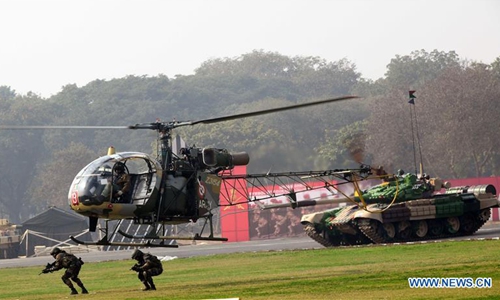
SOURCE: GLOBAL TIMES
New Delhi plans to invite Canberra to join the Malabar naval drill, which has so far been a trilateral exercise among Washington, Tokyo and New Delhi. India is expected to decide whether to send a formal invitation to Australia next week, according to media reports. Malabar naval exercise was initiated in 1992 as a bilateral drill between the US and India, with Japan joining in 2015. The exercise is designed to boost military cooperation among the three nations.
Amid highly strained tensions between China and India over their recent border disputes, some media outlets and political commentators tend to connect the two events, implying that India’s intention to involve Australia in the Malabar drill is directed at China. Putting more pressure on China may be one of India’s considerations, but of course not all of them. New Delhi harbors a grander strategic layout.It’s not unexpected that India hopes to invite Australia to the drills. It will take place sooner or later. India’s strategy is to expand its sphere of influence into the entire Indian Ocean and the South Pacific. Wanting to play a bigger role in the Indo-Pacific region, New Delhi seeks to become a greater power.
In a bid to achieve a leading role in the region, India has to seek more support from international powers. Intending to invite Australia to the Malabar drill can be seen as pursuing support from Australia. If New Delhi is bolstered by Canberra, it will help India to expand its influence into the South Pacific via the Strait of Malacca, in line with India’s whole strategic thinking.
As a country practicing a policy of non-alignment, India will not engage in a military alliance. It can only seek support from carrying out military exercises and signing various military pacts with other powers.
If India sends an official invitation, Australia will certainly accept it. India is clearly aware of Australia’s willingness to expand its role in the Indian Ocean and the South Pacific as well.
Furthermore, Australia’s bilateral ties with China have been deteriorating, some politicians in Australia have recently been arguing that China poses an increasing threat to Australia, which should be properly tackled.
Despite being an intimate ally of the US, Australia is geographically located far away from the US. Merely resting on maintaining an alliance with Washington is insufficient to consolidate Canberra’s strategic position and value in the Indo-Pacific region. With restrained naval might and a tight defense budget, Australia can only achieve to boost its power and influence by cooperating with others.
As a result, Australia would like to enhance its relations with neighboring powers and groups such as India, Japan and the Association of Southeast Asian Nations, as well as some South Pacific island countries.
If Australia is included in the next Malabar drill, it will be the first time that all members of the Quadrilateral Security Dialogue (Quad), an informal strategic forum between the US, Japan, Australia and India, coordinate at a military level. It meets the strategic requirements of the US’ Indo-Pacific Strategy, and interests of the other three members of the group. The four countries to various extents have friction with China in different domains at the present stage. Putting pressure on China will be one of their aims for their possible military drills, which will pose a certain risk to China’s security.
China should raise its vigilance, yet there is no need to be overly nervous. As a leading role in the Quad, the US has attached great importance to the region, exemplified by former president Barack Obama administration’s strategy of rebalance toward the Asia-Pacific region, to the Indo-Pacific strategy of President Donald Trump. Since 2017, the US has labelled China as a strategic rival, believing that a rising China is a threat to the US. Therefore, a possible joint military drill, whose aim includes targeting China, by all members of the Quad, does not come as surprising.
As a response, China should continue to try to maintain normal and friendly bilateral exchanges and interactions with each of the Quad members, in order to weaken the efforts of their joint moves.






